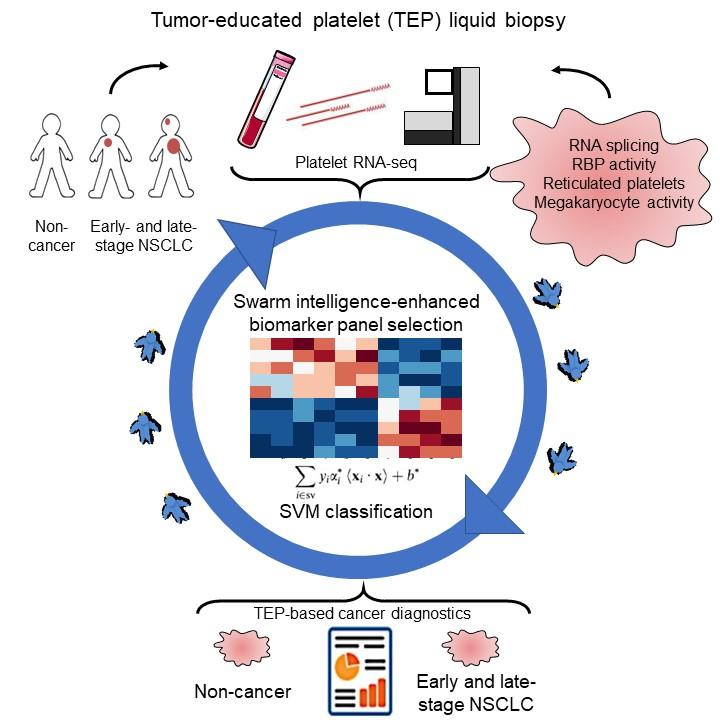Signs of cancer in the blood are known to include nucleic acids, whether freely floating or tucked inside circulating tumor cells or exosomes. And now it appears that telltale nucleic acids can also be tucked inside platelets. Although platelets lack nuclei and, consequently, RNA of their own, they may gather RNA in their travels, and this RNA could come from tumors.
To detect RNA that originates in tumor cells and ends up being absorbed by platelets, researchers in The Netherlands designed a liquid biopsy test called thromboSeq. The researchers found that their test could diagnose non-small-cell lung cancer with close to 90% accuracy by detecting tumor RNA absorbed by circulating platelets, also known as thrombocytes. Encouraged by these results, the researchers suggest that thromboSeq might also show promise in detecting other cancers.
Detailed findings appeared August 14 in the journal Cancer Cell, in an article entitled “Swarm Intelligence-Enhanced Detection of Non-Small-Cell Lung Cancer Using Tumor-Educated Platelets.” By referring to swarm intelligence, the article reflects how thromboSeq makes use of particle-swarm intelligence (PSO), a kind of algorithm inspired by the way swarming birds, insects, and birds self-organize to efficiently adapt to their environment.
“Birds continuously adjust their location in the swarm relative to each other, thereby increasing the flock's coverage and, thus, the efficiency of the food-searching process,” explained Myron Best, the first author of the current study and a researcher at the department of neurosurgery of the VU University Medical Center in Amsterdam and the Cancer Center Amsterdam. “We applied this natural phenomenon to our algorithms, which make use of the complex RNA repertoire present in platelets.”
The “tumor-educated platelets” cited in the title refer to platelets that interact with tumors. Platelets in a cancer-free person will contain a different compilation of RNA than tumor-educated platelets.
“Here we demonstrate that particle-swarm optimization (PSO)-enhanced algorithms enable efficient selection of RNA biomarker panels from platelet RNA-sequencing libraries (n = 779),” wrote the article’s authors. “This resulted in accurate TEP [tumor-educated blood platelet]-based detection of early- and late-stage non-small-cell lung cancer…independent of age of the individuals, smoking habits, whole-blood storage time, and various inflammatory conditions.”
“Ultimately, the aim of liquid biopsy-based cancer detection is to detect all cancers at once in an early stage—an all-in-one test,” noted Best. “The thromboSeq test might not only provide lung cancer diagnostics, but potentially any other tumor type as well, and may enable tumor-type stratification.”
Platelets are short-lived blood cells known to form blood clots in response to injury. However, platelets also respond to a range of inflammatory events and cancer. Because platelet cells don't have a nucleus of their own, all RNA found in platelets either comes from megakaryocytes (the cells that form platelets in bone marrow) or from RNA the platelets have absorbed while circulating in blood.
The researchers studied blood samples of more than 700 people, which included people diagnosed with late-stage non-small-cell lung cancer, a smaller group with early-stage cancer, and a control group with no known cancer. People with diseases such as multiple sclerosis, chronic pancreatitis, and coronary artery disease were included in the control group to make sure the algorithm was screening for cancer-specific RNA and not RNA that platelets generally encounter in inflammation or disease.
As it ran, the thromboSeq algorithm scanned the approximately 5000 different RNA molecules found in platelets, continuously optimizing its panel of RNA genes, arriving at the few that indicate a cancerous tumor. Then, the researchers ran screening tests of the blood samples to see how accurately they could diagnose cancer.
The thromboSeq test could diagnose early-stage cancer with 81% accuracy and late-stage cancer with 88% accuracy. In a validation control group matched for age, smoking status, and blood storage time, the algorithm yielded an accuracy up to 91%. Best believes the technology is robust enough to begin clinical trials.
“Although the tumor-educated platelets blood test does not, so far, provide perfect predictions, it may complement alternative liquid biopsy biosources such as cell-free DNA, extracellular vesicles, circulating proteins, and circulating tumor cells, as well as imaging modalities such as computed tomography scans,” asserted Best.
Best and colleagues plan to further optimize their algorithm with more samples and tests in people who are suspected to have lung cancer but are not yet diagnosed. “We also aim to further understand the biological mechanism responsible for platelet education in the presence of cancer,” he added.


